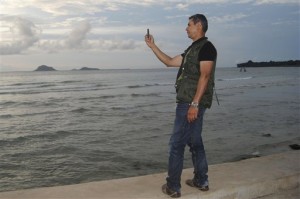ZAMBOANGA CITY, Philippines—An official of the Moro National Liberation Front in Sulu decried Thursday a claim by the local police that a senior MNLF leader as among the people allegedly holding Jordanian TV journalist Baker Abdulla Atyani and his Filipino crew.
Dr. Samsula Adju, who chairs the MNLF Sulu Peace Task Force, said Tahil Sali, vice chairman for military affairs of the MNLF in Sulu, was “a dedicated Moro soldier” who despised the Abu Sayyaf and could not have possibly worked with any of the outlawed group’s leaders.
“Whoever is trying to spread around reports implicating Sali is a peace spoiler,” Adju said.
Earlier, Sulu police director Senior Supt. Antonio Freyra said Sali was among those securing the Jordanian journalist and his crew inside the Abu Sayyaf lair in Patikul.
He said Atyani had previously arranged an interview with Abu Sayyaf leader Yasser Igasan and this supposedly angered Radulan Sahiron, a senior Abu Sayyaf leader.
“We gathered from intelligence community that Radulan Sahiron got mad because he was ignored and no coordination was made to him. Sahiron tapped some followers of Tahil Sali to secure the trio,” he said, adding that this was raw information.
Adju said associating any MNLF leader with the Abu Sayyaf was uncalled for because the MNLF has been helping the government against the group’s activities.
He said Ustadz Habier Malik, MNLF’s chief of staff; Ustadz Khaid Adjibun, chair of the Lupah Sug State Revolutionary Committee, and Tahil, had joined efforts to locate Atyani and his Filipino crew, Ramelito Vela and Rolando Letrero.
He said that based on what the MNLF had gathered, Atyani and the two Filipinos were with Sahiron in Patikul.
Meanwhile, Sulu Gov. Abdusakur Tan, who was attending a meeting of Mindanao executives in Davao City, said Wednesday he was definite that Atyani had not been kidnapped.
“It’s final. It is not kidnapping. It’s just that he has not re-appeared. We are waiting for his re-appearance,” he told the Inquirer.
Tan also said government authorities have to stop worrying about the Jordanian journalist. “Why should we worry when his own network (Al Arabiya) is not worrying a bit?” Tan said.
He also said whatever Atyani’s activity was in Sulu should not bother anyone. “Let us not bother about what he is doing as long as it is not illegal,” The said.
Nonetheless, Tan said he wanted to retrace “where this all started.”
“Who started this report that he was missing?” he said.
A few days after he failed to return to his hostel, which the police reported, an official in Manila is reported to have suggested that Atyani could be a conduit of terrorists and that the Jordanian journalist was a favored one by the al-Qaeda.
But the National Union of Journalists of Philippines (NUJP) said the statement linking Atyani with terror groups was irresponsible and endangered the lives of the journalist and his crew.
“The government official has no basis maligning the reputation of a journalist – foreign or local, simply on the basis of guilt by association from stories that they legitimately gathered and reported,” the NUJP said.
The journalists’ group said Atyani’s interviews with Bin Laden and other al-Qaeda leaders were not enough basis to brand him a terrorist.
“The flimsy reason of this suspicion—his interviews with Osama bin Laden—also stereotypes and endangers journalists who conduct interviews on personalities and groups considered to be illegal and enemies of the state,” the NUJP said.
The NUJP also rebuked Interior Secretary Jesse Robredo for seeking to ban Atyani from the Philippines.
.
“Robredo should therefore think twice in ordering a ban against any legitimate journalist – local or foreign as this is a clear affront to the freedom of the press,” the NUJP added.
The NUJP said “journalists do not need approval especially from government, the police and the military, before covering a story.”
“Journalists and media groups have since advocated for safe coverage in conflict situations; while Atyani’s foray into Jolo, Sulu, was not without its perils, he knew the risks and until he cannot explain himself, we should give him the benefit of the doubt and not impute any baseless and irresponsible statements,” the NUJP said.
Chief Supt. Mario Avenido, police chief of the Autonomous Region in Muslim Mindanao, said the police were drafting guidelines for journalists covering perceived dangerous areas and hostile environments, such as Sulu.
Avenido said under the guidelines, journalists are prohibited from going into areas where journalists were kidnapped in the past. Reports from Julie S. Alipala, Germelina Lacorte and Karlos Manlupig, Inquirer Mindanao
